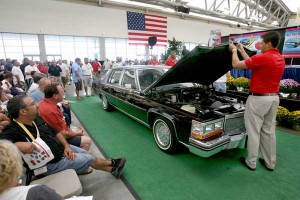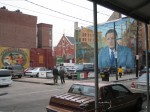 Former Federal Reserve Chairman Alan Greenspan, trusted by the previous administration and the current one, especially after he endorsed the government bailouts of both, describes in this piece precisely what the FUD Factor is all about. Fear, Uncertainty, and Doubt. It explains, as he details in this piece, why there exists a jobless recovery. If by ‘recovery’ you mean not a total collapse of the economy.
Former Federal Reserve Chairman Alan Greenspan, trusted by the previous administration and the current one, especially after he endorsed the government bailouts of both, describes in this piece precisely what the FUD Factor is all about. Fear, Uncertainty, and Doubt. It explains, as he details in this piece, why there exists a jobless recovery. If by ‘recovery’ you mean not a total collapse of the economy.

Fear undermines America’s recovery
By Alan Greenspan
Although rising moderately this year, US fixed capital investment has fallen far short of the level that history suggests should have occurred given the recent dramatic surge in corporate profitability. Combined with a collapse of long-term illiquid investments by households, they have frustrated economic recovery. These shortfalls, the result of widespread private-sector anxiety over America’s future, have defused much, if not most, of the impact of the administration’s fiscal stimulus. Moreover, the activism embodied in such programmes has itself stoked the degree of anxiety.
The instinctive reaction of businessmen and householders to uncertainty is to disengage from those activities that require confident predictions of how the future will unfold. For non-financial corporations (half of gross domestic product), the disengagement is best measured by the share of liquid cash flow allocated to illiquid long-term fixed asset investment. In the first half of 2010, that share fell to 79 per cent, its lowest reading in the 58 years for which data are available.
The corresponding surge in the proportion of liquid assets following the Lehman bankruptcy was the most rapid in postwar history, amounting to a rise of nearly $400bn. By mid-2010 total liquid assets had risen to $1,800bn, the highest share of total assets in nearly a half century. Without this unprecedented cash flow diversion, the rate of increase in capital expenditures of non-financial corporations would have been double the modest increase that emerged during the first half of this year.
In such an environment, the equity premium (the excess return that equity produces over the risk-free rate) has become exceptionally elevated. As estimated by JPMorgan, it is currently “at a 50-year high”.
American households have shifted their cash flows from illiquid real estate and consumer durables to paying down mortgages and consumer debt. Commercial banks are exhibiting a similar reduced tolerance towards risk on partially illiquid lending. A trillion dollars of excess reserves remains parked, largely immobile, at Federal Reserve banks yielding only 25 basis points with little evidence of banks seeking higher returns through increased lending.
It is this rapid rise in aversion to illiquid risk that explains a large part of the anaemic recovery in the US. Construction outlays, almost all long-term, are down 43 per cent in real terms since their peak in 2006 and reflect the heaviest price discounting of any major fixed asset class.
The pronounced lack of tolerance for illiquid investment risk is quite at variance with current relatively narrow corporate bond spreads. Since a portfolio of liquid privately issued 10-year bonds can be sold virtually at will, the portfolio is the equivalent of a very short-term asset that happens to exhibit high price and interest rate volatility. The difference between liquid and illiquid assets is the reason non-financial corporations, whose assets are largely illiquid, maintained net worth amounting to 45 per cent of assets at the end of 2006 (just prior to the onset of the crisis) compared with 10 per cent for commercial banks.
In these extraordinarily turbulent times, it is not surprising that important disagreements have emerged among policymakers and economists. Almost all agree activist government was necessary in the immediate aftermath of the Lehman bankruptcy. The US Treasury’s support of banks through the troubled asset relief programme (Tarp), and the Federal Reserve’s support of the commercial paper market and money market mutual funds, were critical in stemming the freefall.
But the value of fiscal stimulus has been the subject of wide debate. Fiscal stimulus – the amount of tax cutting and federal spending increases – from the programme’s inception in early 2009 was approximately $480bn. During the same period, the cumulative shortfall in private fixed capital investment measured against the long-term average shares of cash flow appears to have been about $325bn.
Most in the business community attribute the massive rise in their uncertainty to the collapse of economic activity, but its continuance since the recovery took hold is attributed to the widespread major restructuring of our financial system and the burgeoning federal deficit, which creates critical future tax uncertainty.
Only the deficit lends itself to being quantified. Fixed capital investment as a share of cash flow over the past four decades has been significantly (negatively) correlated with the ratio of the federal deficit to GDP, with the deficit ratio leading the fixed investment share by nine months.* This would imply that the federal deficit as a percentage of GDP since September 2008 (cyclically adjusted to remove the effect of a weaker economy), accounted for as much as a third of the $325bn shortfall in business capital investment since early 2009.
But an indeterminate amount of the remaining shortfall reflects both a direct and indirect hobbling of vital financial intermediation. It is going to take years to address the unprecedented complexity of final rulemaking required in the massive Dodd-Frank bill. The inevitable uncertainty engendered will inhibit financial innovation and intermediation, and render the rules that will govern a future financial marketplace disturbingly conjectural. This is bound to have a significant impact on economic growth. Business planners must now confront a much wider set of scenarios that could affect the profitability of contemplated long-term commitments. This wider set, of necessity, increases risk premiums on illiquid assets.
The critical question, of course, is how much of a contraction in deficits and a decrease in the frenetic pace of new regulations can assuage the sense of a frightening future, allowing the natural forces of economic recovery to take hold. That process, which I outlined in earlier Financial Times articles on March 23 and June 25 2009, would accelerate if fear-determined equity premiums were reduced and stock prices accordingly rose. That would spur capital investment (they are highly correlated) and wealth-driven consumer expenditures. Economic growth would finally bring an important fall in unemployment.


